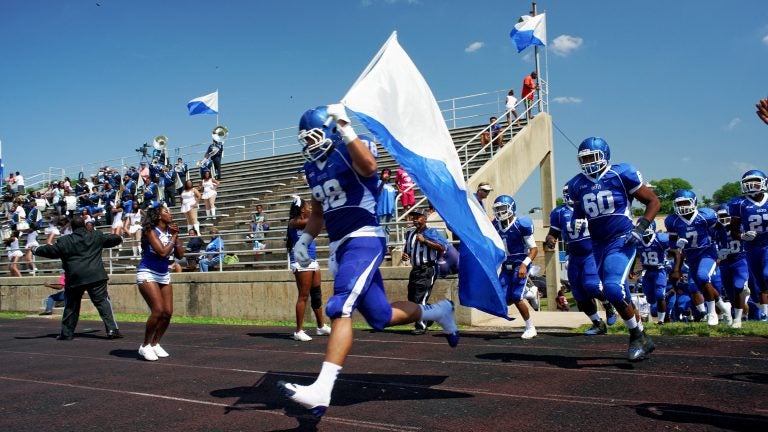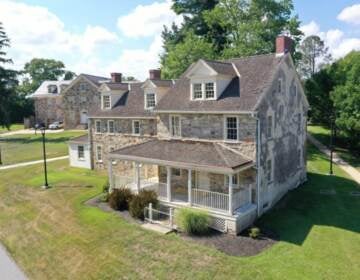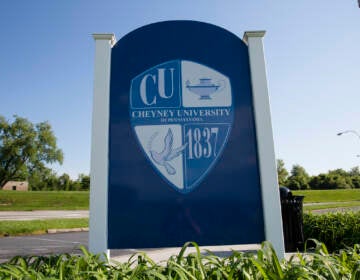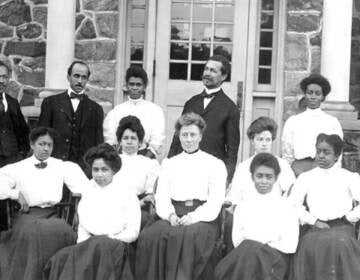Pa. public universities ‘treading water’ with declining enrollment, higher than average tuition
Enrollment across the 14 state-owned schools has decreased by 18 percent since 2010, dropping to less than 100,000 students in fall 2018.

In this 2015 photo, Senior Christian Sanchez carries the flag for the Cheyney University football team (Bastiaan Slabbers for WHYY)
During a candid budget hearing Thursday, lawmakers heard a bleak tale of Pennsylvania’s system of higher education.
In particular, Cheyney University risks losing its accreditation next year amid declining enrollment and growing debt.
Enrollment across the 14 state-owned schools has decreased by 18 percent since 2010, dropping to less than 100,000 students in fall 2018. Cheyney, the country’s oldest historically black college, has seen a particularly steep decline — dropping from 1,586 students in 2010 to 469 in 2018.
Public university enrollment is down nationwide, in part due to declining numbers of high school graduates.
Daniel Greenstein, who took over as chancellor of the Pennsylvania State System of Higher Education last fall, told the Senate Appropriations Committee that the universities are working on ways to attract more students and prepare them for the workforce, but made clear it will be difficult without more state funding.
“Next year is going to be a tough year,” said Greenfield. “You have to remember that our universities have been basically in recession management for well over a decade. There isn’t much left to cut.”
Over the past four years, the state has steadily increased funding for public universities, following six years of decreased or stagnant budgets, but funding remains lower compared to the start of the recession.
“We were essentially at the same place for funding 10 years ago as we are today,” State Sen. Judith Schwank, D-Berks, noted Thursday.
In 2018, the system received $468 million from the state, about 27 percent of its total budget. The average across the country is around 54 percent. Pennsylvania ranks 48 nationally for state share of public higher education funding.
Tuition hikes have made up for the gap, making Pennsylvania’s state universities considerably more expensive than the national average.
According to data from the National Center for Education Statistics, average in-state tuition at a public university is $6,131. In Pennsylvania, that price tag is $12,186.
That’s compared to $8,335 in Delaware, $9,338 in New Jersey, $6,226 in Ohio, $6,870 in New York, and $5,650 in West Virginia.
In some states, including California, Texas, and Washington, the rates public colleges charge for non-residents is cheaper than Pennsylvania’s in-state tuition.
Greenstein told senators that this puts the state-owned universities in competition not only with private and community colleges, but also with state schools nationwide. He estimated that the system will soon face a $70 million deficit, and said funding gaps cannot be made up by increasing tuition without alienating students from low- and moderate-income families.
Senator Scott Martin, (R-Lancaster), questioned whether the university system has done enough to streamline operations. As student enrollment has decreased by 18 percent, staff reduced by just 8 percent, he said.
“We have not yet done everything we can to align our budgets with our revenues,” said Greenstein. Increasing retention and enrollment is a priority, he said, in part by looking to attract new students. He also spoke of working with the faculty union on a phased retirement plan for long-serving staff.
At the same time, he said the greatest tuition decreases could come from Pennsylvania increasing its state contribution to the national average. If they did so, said Greenstein, the system could lower tuition to around $9,500. That would require an additional $666 million in state subsidies.
“These are public policy choices,” said Greenstein. “Those are choices we have made in this state and they are choices which, frankly, over ten years, in my opinion, will be devastating to pathways into and beyond the middle class, and ultimately the workforce.”
The state budget for PASSHE is currently $468 million. The system requested an increase in state aid of almost $38 million, or 8 percent. Governor Tom Wolf has proposed an increase of $7 million.
Last week, House Appropriations Committee Chairman Stan Saylor, (R-York), seemed to lay the public university systems’ problems at its own feet, telling Greenstein at a separate budget hearing that lawmakers have “lost faith” in the system.
“In many cases, you can go to other schools at a cheaper cost than you can to our state system, and we have to get back to that if we want the system to survive,” he said.
This week, by contrast, lawmakers thanked Greenstein for his candor, and asked questions about how the universities can better compete for students.
State Sen. Vincent Hughes, laid the blame with lawmakers.
“Governors and legislatures have failed the system dramatically,” he said.
Hughes, a trustee at Cheyney University, also questioned Greenstein about the future of that institution. Greenstein gave a harsh assessment, citing six-year graduation rates of just 15-25 percent, with nearly a third of students defaulting on their loans.
“These are in my opinion the most deserving students we enroll in the system, and we are delivering results for them that are weak,” he said.
Cheyney owes $43 million in debt to the public university system, which Greenstein plans to pay down with the proceeds from other campuses. He says it will likely incur another $9 to $10 million in debt this year. Those debts have put Cheyney’s accreditation in danger, which would mean the school could no longer grant degrees.
Greenstein laid out three possible paths for the university: continue as is, which he dismissed as unviable; closure, which he called “the wrong thing to do.”
Or, Greenstein said, “acknowledge the likelihood that the university will lose accreditation” later this year, and pivot to another educational model.
“There is real innovation in higher education today in arenas that do not require accreditation,” said Greenstein, pointing to various forms of workforce training or technical education. “The potential opportunity for Cheyney not only to survive and thrive, but to create a model that others may need to follow into the future is very high.”
Hughes pushed back on that interpretation, pointing to increased applications and deposits by accepted students over the previous year.
“The notion of HBCUs is not predicated on hard and fast numbers. It’s predicated on a history of discrimination that required a place to be in position to educate folks who could not be educated elsewhere by law,” Hughes said.
Last year, the university opened two new institutes to try to reverse declining numbers, and began to invest more in recruitment. Greenstein appeared to be skeptical.
“I wish the chancellor would have been more optimistic in his comments,” said Hughes when reached after the hearing.
Senate Appropriations Chairman Patrick Browne, (R-Lehigh), closed the meeting with a call to action.
“None of this is going to happen unless we make some hard decisions. And I think we’ve been in denial for a long time,” he said. “We’re just treading water. And, if we keep treading water, the only people at risk will be our young people that really need the value of a higher education institution, and we have the assets here to do it.”
WHYY is your source for fact-based, in-depth journalism and information. As a nonprofit organization, we rely on financial support from readers like you. Please give today.






